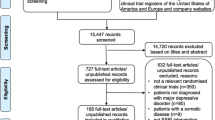Abstract
Objective
Tapering of selective serotonin reuptake inhibitor (SSRI) therapy, as opposed to abrupt discontinuation, has been recommended by several guidelines and in the literature in order to diminish the occurrence of discontinuation symptoms. However, the evidence of a favourable effect of tapering is limited, and it is unclear how patients ought to discontinue SSRIs in daily life. The aim of this study was to examine the way in which patients discontinue SSRI therapy in clinical practice and to compare the effect of tapering with that of abrupt discontinuation on the occurrence of discontinuation symptoms.
Methods
Patients (n=74) who recently discontinued SSRI therapy completed a questionnaire containing questions about discontinuation symptoms (DESS events), the prescribed SSRI, reasons for discontinuation, way of discontinuation, knowledge of discontinuation symptoms, impact on daily life and patient counseling and education. The number of DESS events was compared among groups (abrupt discontinuation versus tapering; age; male versus female; paroxetine versus other SSRIs; knowledge of discontinuation symptoms at start of therapy versus lack of knowledge).
Results
A total of 66 patients were eligible for analysis. Of all patients ending SSRI therapy, 21% abruptly discontinued therapy. There was a significant difference in the number of DESS events between abrupt discontinuation and tapering of SSRI therapy (12.0 versus 5.9). There was also a tendency for an adverse effect of lack of knowledge of discontinuation symptoms at the start of therapy on the number of DESS events (8.9 versus 5.5).
Conclusion
One in five patients abruptly discontinued their SSRI therapy in clinical practice. Abrupt discontinuation caused a larger increase in the number of discontinuation symptoms than tapering. We therefore advise tapering SSRI therapy in clinical practice to prevent unnecessary adverse effects of discontinuation.
Similar content being viewed by others
References
Rosenbaum JF, Zajecka J (1997) Clinical management of antidepressant discontinuation. J Clin Psychiatry 58:37–40
Lejoyeux M, Adès J (1997) Antidepressants discontinuation: a review of the literature. J Clin Psychiatry 58:11–16
Haddad PM (2001) Antidepressant discontinuation syndromes. Clinical relevance, prevention and management. Drug Saf 24:183–197
Price JS, Waller PC, Wood SM, MacKay AV (1996) A comparison of the post-marketing safety of four selective serotonin re-uptake inhibitors including the investigation of symptoms occurring on withdrawal. Br J Clin Pharmacol 42:757–763
Schatzberg AF, Haddad PM, Kaplan EM, Lejoyeux M, Rosenbaum JF, Young AH, Zajecka J (1997) Possible biological mechanisms of the serotonin reuptake inhibitor discontinuation syndrome. J Clin Psychiatry 58:23–27
Einbinder E (1995) Fluoxetine withdrawal. Am J Psychiatry 152:1235
Black DW, Wesner R, Gabel J (1993) The abrupt discontinuation of fluvoxamine in patients with panic disorder. J Clin Psychiatry 54:146–149
Rosenstock HA (1996) Sertraline withdrawal in two brothers: a case report. Int Clin Psychopharmacol 11:58–59
Anderson IM, Nutt DJ, Deakin JFW (2000) Evidence-based guidelines for treating depressive disorders with antidepressants: a revision of the 1993 British Association for Psychopharmacology guidelines. J Psychopharmacol 14:3–20
Anonymous (1999) Withdrawing patients from antidepressants. Drug Ther Bull 37:49–52
Young AH, Currie A (1997) Physicians’ knowledge of antidepressant withdrawal effects: a survey. J Clin Psychiatry 58:28–30
Demyttenaere K, Enzlin P, Dewé W, Boulanger B, Bie JD, Troyer WD, Mesters P (2001) Compliance with antidepressants in a primary care setting, 1: beyond lack of efficacy and adverse events. J Clin Psychiatry 62:30–33
Bull SA, Hu XH, Hunkeler EM, Lee JY, Ming EE, Markson LE, Fireman B (2002) Discontinuation of use and switching of antidepressants: influence of patient-physician communication. JAMA 288:1403–1409
Rosenbaum JF, Fava M, Hoog SL, Ascroft RC, Krebs WB (1998) Selective serotonin reuptake inhibitor discontinuation syndrome: a randomised clinical trial. Biol Psychiatry 44:77–87
Haddad PM, Devarajan S, Dursun SM (2001) Antidepressant discontinuation (withdrawal) symptoms presenting as ‘stroke’. J Psychopharmacol 15:139–141
Acknowledgements
We would like to thank the participating pharmacists for including patients and Olga van Vemde en Chantal Fleers for collecting the data.
Author information
Authors and Affiliations
Corresponding author
Rights and permissions
About this article
Cite this article
van Geffen, E.C.G., Hugtenburg, J.G., Heerdink, E.R. et al. Discontinuation symptoms in users of selective serotonin reuptake inhibitors in clinical practice: tapering versus abrupt discontinuation. Eur J Clin Pharmacol 61, 303–307 (2005). https://doi.org/10.1007/s00228-005-0921-x
Received:
Accepted:
Published:
Issue Date:
DOI: https://doi.org/10.1007/s00228-005-0921-x




